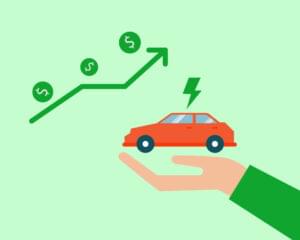Anybody can experience it sooner or later. As the old clunker exhales its final, smoke-filled breath by the side of the road, you are forced to accept an expensive truth: You need new wheels. Although buying a brand-new car might be attractive, your wise friend advises against doing so because secondhand cars are more cost-effective overall. Here’s how to choose the option that’s best for you.
KEY LESSONS
- Although they can have a higher sticker price and higher insurance costs, new cars typically have the most up-to-date safety features and are extremely likely to be reliable.
- Because of their early years’ substantial depreciation and the possibility that you won’t require as much insurance coverage, used cars are typically less expensive.
- Although more expensive than other used cars, certified pre-owned vehicles may still be in nearly new condition.
- Consider the continuous costs of maintenance, repairs, gas, and insurance when choosing between a new car and a used car.
Benefits of Purchasing a New Vehicle
There is no doubting the curb appeal of a brand-new car, from that new-car scent to the bright paint and spotless interior, as well as the “oohs” and “aahs” when your friends first see it. A new car is an indisputable status symbol in our consumption culture that announces your success (literally). A new car has certain benefits beyond its appearance.
- Protection under warranty and dependability The majority of new automobiles are dependable, and if something does go wrong, it’s likely to be covered by the manufacturer’s guarantee. Purchasing a brand-new car also means you won’t have to worry about how it was handled before to your purchase.
- Free towing is available Roadside assistance is standard on a lot of new vehicles. This can spare you from having to pay for coverage out of pocket or from having to pay for a tow if your car breaks down.
- the newest capabilities The most recent safety features and fuel economy criteria are likely to be found in new vehicles.
- enticing financial offers If you have strong credit, many automakers and dealers offer financing plans with low or no interest. Because of this, financing a new car may be less expensive than financing a used one.
The drawbacks of purchasing a new vehicle
Naturally, there are a few things against modern autos as well.
- pricey to purchase A new car purchase is expensive. If you’re financing the purchase with an auto loan, you’ll probably borrow more money than you would if you were buying a used car and wind up paying more interest over time.
- quick to lose value Newer vehicles lose value more quickly than worn ones. The first few years of ownership are when a car loses the most value, and a significant portion of that loss occurs as soon as it leaves the lot. According to some calculations, the immediate loss may be 20% of the car’s worth. This is due to the fact that you pay the retail price when you buy a new car from a dealer. The car is only worth its lower, wholesale price once you leave the lot. This is the price the dealer would accept if you tried to sell the item back thereafter.
- Expensive to insure Due to their greater replacement values, new cars also cost more to insure than used vehicles.
- Not always new Last but not least, new autos don’t last forever. You’ll experience your first scratch or nick in a day, a week, or a month. The floor might be soiled, the doors might be dented, and that fresh new car fragrance might be gone by the end of the first year. Naturally, the monthly payments will continue for a long time.
Benefits of Purchasing a Used Vehicle
The marketing term for used cars, “pre-owned vehicles,” may not have the same allure as new ones. They do, however, have certain benefits.
- lower costs When an automobile is put on the used car market, a lot of its depreciation has already occurred (and been paid for by the prior owner). Buying used presents the chance to get a better vehicle for your money.
- Warranties offered The most expensive parts of a car’s drivetrain are now covered by warranties for 200,000 miles in some models. You will probably receive a warranty that goes beyond the original manufacturer’s guarantee if you purchase a certified pre-owned vehicle from a dealer. (Certified pre-owned vehicles are typically more expensive than other used vehicles, but they have also undergone thorough inspection and maintenance as necessary.) Of course, purchasing a car that requires some time and attention might significantly lower your cost if you are skilled with a wrench.
- Lower cost to insure While a dealership could insist that you finance a new automobile with full insurance coverage, buying a used car outright could allow you to save money on insurance.
The Drawbacks of Purchasing a Used Vehicle
Whether or whether they are still covered by warranties, used cars nevertheless have some unknowable costs. There is always the risk of purchasing someone else’s problem because you don’t know how the car was treated by the previous owner or the reason it was traded in. Some other issues:
- Increased mileage The lifespan of a used car may be shortened by the higher mileage it is expected to have. If you acquire a car with a greater mileage, it’s conceivable that you’ll need to replace it sooner rather than later, which will increase the cost of your automobile purchase.
- Limited options Finding a used car with the exact features and upgrades you want might be difficult.
- Lessening of consumer protections Because lemon rules frequently only apply to vehicles under a specific age and with fewer miles on the odometer, you could have fewer options if you discover that you’ve bought a lemon than you would with a new car.
Which is better, new or used cars?
Think about the initial cost as well as the recurring expenses when deciding whether to purchase a new or used car. With a new or used car, you can be liable for items like the following:
- One-time payment
- Tax, title, and closing costs
- Inheritance tax
- Vehicle insurance
- Maintenance
- Repairs
- Oil and gas
For the first few years, you might spend less on repairs if you buy a new automobile. You could be prepared to trade it in by the time the car starts requiring significant maintenance and repairs. If you pay cash for a used automobile, you might pay more for maintenance but less in interest over the course of a loan. Therefore when comparing the price of buying a new car vs a used car, take all the factors into account.
But keep in mind that choosing between a new and used car isn’t solely a financial choice. Although while secondhand automobiles are typically less expensive—at least at first—you might not be able to get all the amenities you desire without making some concessions. It might pay to look at both unless you’re in a serious rush to make a purchase. Examine the options on both the used lot and the new car dealership, contrast the price differences, and consider which choice you and your finances would be most comfortable with in the long run.




